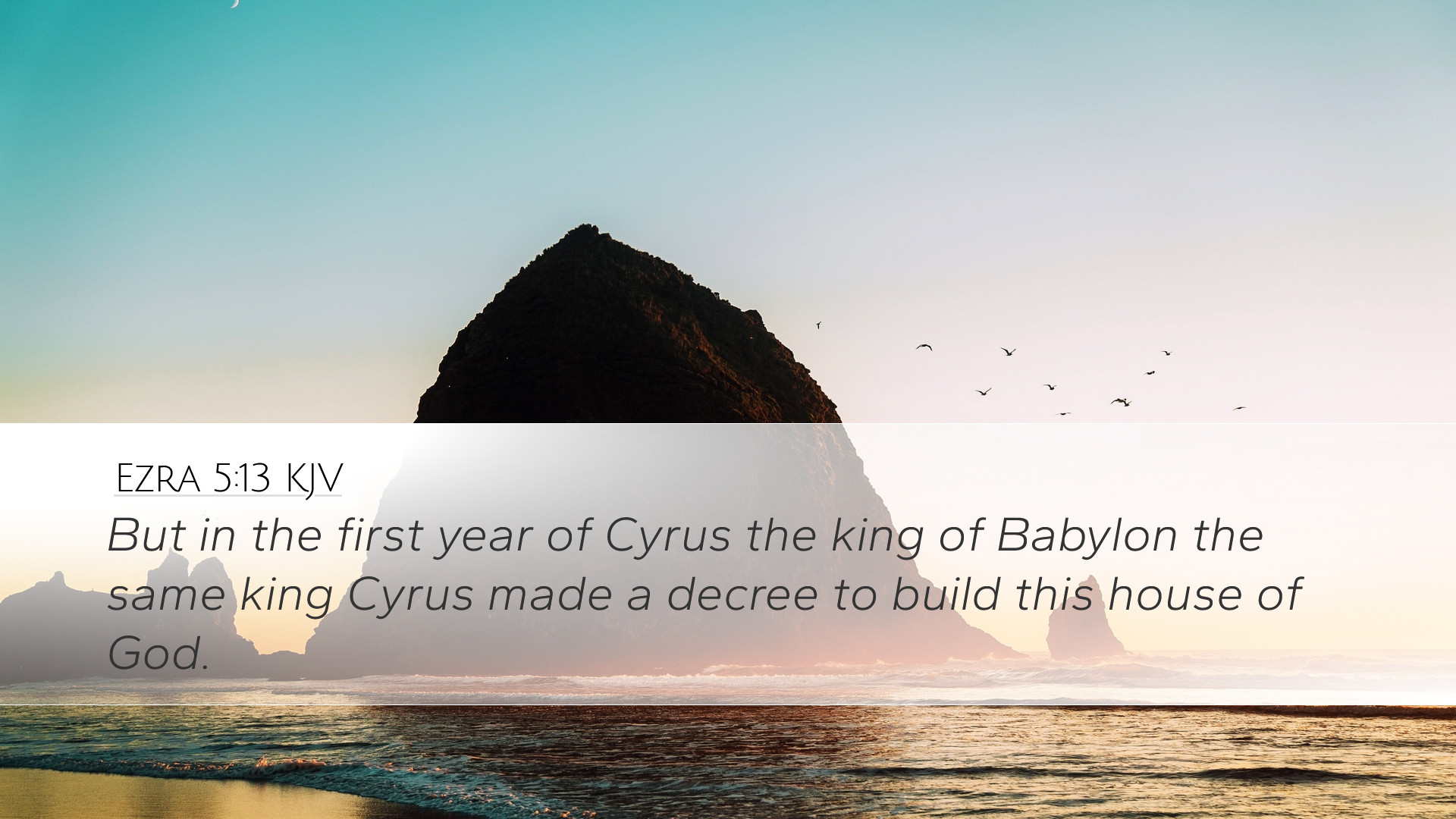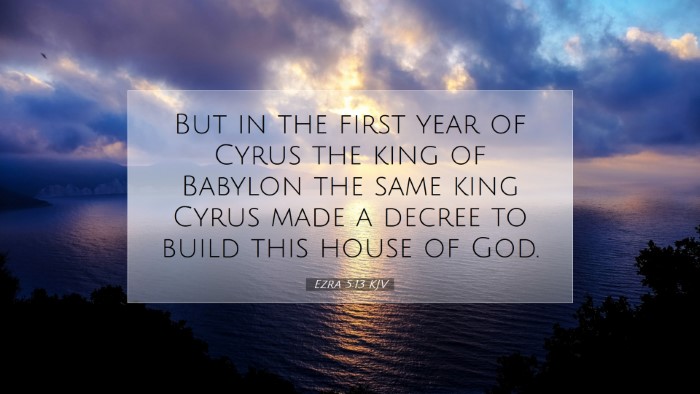Old Testament
Genesis Exodus Leviticus Numbers Deuteronomy Joshua Judges Ruth 1 Samuel 2 Samuel 1 Kings 2 Kings 1 Chronicles 2 Chronicles Ezra Nehemiah Esther Job Psalms Proverbs Ecclesiastes Song of Solomon Isaiah Jeremiah Lamentations Ezekiel Daniel Hosea Joel Amos Obadiah Jonah Micah Nahum Habakkuk Zephaniah Haggai Zechariah MalachiEzra 5:13
Ezra 5:13 KJV
But in the first year of Cyrus the king of Babylon the same king Cyrus made a decree to build this house of God.
Ezra 5:13 Bible Commentary
Commentary on Ezra 5:13
Ezra 5:13: "But in the first year of Cyrus the king of Babylon, the same king Cyrus made a decree to build this house of God."
Introduction
The verse Ezra 5:13 provides a critical reminder of the providence of God in the affairs of nations and individuals. This passage marks a pivotal moment in the restoration of the Jews and the rebuilding of the temple in Jerusalem.
The Historical Context
Understanding Ezra 5:13 necessitates an appreciation of the historical backdrop. The Jewish people, having returned from Babylonian exile, faced considerable opposition in rebuilding the temple. This opposition arose from their neighbors who felt threatened by the reconstruction of a significant religious and national symbol.
- Restoration Period: The return of the exiles was initiated under the leadership of Zerubbabel and Jeshua, as recorded in previous chapters of Ezra. It highlights God's faithfulness in restoring His people.
- Cyrus's Decree: The reference to Cyrus is crucial as it emphasizes the timing of God's interventions through worldly leaders. Cyrus's decree was a divine orchestration allowing the Jews to rebuild their temple.
Noteworthy Insights from Commentators
Matthew Henry's Commentary
Matthew Henry observes that the decree of Cyrus serves to remind us of the sovereign rule of God over the hearts of kings. He emphasizes the importance of divine providence, suggesting that God's plans will be fulfilled despite human opposition and obstacles.
Albert Barnes' Notes
Albert Barnes elaborates on the significance of the phrase “the first year of Cyrus.” He indicates that it marks the beginning of a new era for the Jewish people—a restoration not only of a physical structure but of their identity as a worshiping community. Therefore, the decree signifies a turning point.
Adam Clarke's Commentary
Adam Clarke focuses on the notion of divine commission and favor. He expounds on how God's providence was at work through Cyrus, who was a vessel for God's purpose even though he did not recognize it. Clarke's insights remind us that God's purposes can be fulfilled through unexpected means.
Theological Implications
Ezra 5:13 raises essential theological themes relevant to pastors, students, theologians, and scholars:
- God's Sovereignty: This verse reaffirms God's control over human history. It instills confidence in believers that God is actively involved in the world, leading to the fulfillment of His promises.
- Faith Amidst Opposition: The rebuilding effort faced significant resistance, yet this verse illustrates the idea that divine decree can outweigh human opposition. It calls on believers to hold steadfast to their faith in challenging times.
- Divine Intervention: The mention of Cyrus points to God's unexpected ways of working through leaders and nations, indicating that the secular realm can play an important role in fulfilling God's plans.
A Call to Action for Modern Believers
This verse prompts a reflection on our response to God’s initiatives in our lives and communities. The historical events surrounding Ezra's time prompt questions about how we participate in the rebuilding of God’s kingdom today.
- Engagement in Community: Just as the exiles collectively worked on the temple, modern believers are called to engage with their communities, reflecting God’s love and reconciliation.
- Trust in God’s Timing: As the decree came in the appointed time, we are reminded that God's timing is perfect. Believers are encouraged to trust His plans, even when they are not immediately visible.
- Embrace Challenges: Understanding the obstacles faced during the rebuilding process can motivate believers to persevere through their own challenges, recognizing them as part of God's larger plan.
Conclusion
In summarizing Ezra 5:13, the commentary emphasizes the hope and faith that come from recognizing God’s sovereignty over our histories. The verse serves as a reminder that God uses both faithful leaders and international events to accomplish His divine purposes. It calls us to reflect on our role in God’s redemptive work and challenges us to trust in His overarching plan.
Further Reflection
As we consider Ezra 5:13, let us take time to meditate on God’s faithfulness to His people throughout history and within our own lives. It is through prayer, study, and community that we gain deeper insights into His word. May we be encouraged as we witness God at work in our world today.


